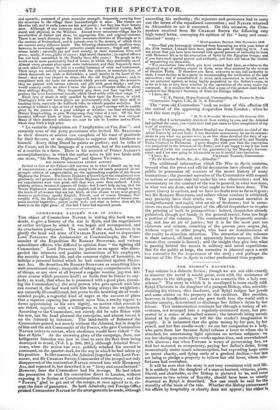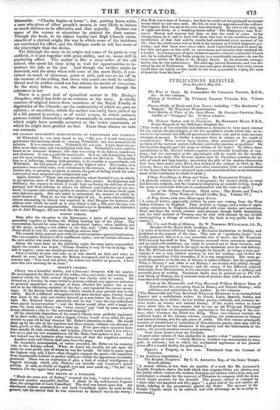THE BISHOP'S DAUGHTER.
Tins volume is a didactic fiction ; though we are not able exactly to discover the moral it would point, even with the assistance of the motto in the titlepage, "There is no cosmetic like a holy con- science." The story in which it is enveloped is more easily told. Sybyl Chevenix is the daughter of a paragon Bishop, who, notwith- standing his virtues, dies insolvent, and Sybyl resigns her jewels and some claims on his property to the creditors. Her sacrifice, however, is insufficient ; and she goes forth into the world with a slender annuity, determined to discharge her father's debts by her labour. This determination conducts her through a variety of ad- ventures, not arranged into a regularly-connected story, but pre- sented in a series of detached scenes ; the intervals being merely hinted at by the author, or left for the reader's imagination to supply. It is intimated that she gains money by her pen, by her pencil, and her fine needle-work : we see her companion to a lady, who parts from her because Sybyl refuses a lover to whom she is attached, for entertaining light opinions on serious subjects : we see her slaving on embroidery-works against time, and overwhelmed with distress; but when Fortune is weary of persecuting her, we find her restored to competency, paying her father's debts, living economically under much misconception, but expending large sums in secret charity, and dying early of a gradual decline,—her last act being to pledge a property to relieve her old lover, whom mis- fortunes had overtaken.
It will be seen that the story is not very consistent with real life. It is unlikely that the daughter of a man so learned, virtuous, pious, liberal, and charitable, as the Bishop is pictured to be, and tutor moreover to two scions of Royalty, should have been so utterly deserted as Sybyl is described. Nor can much be said for the morality of the basis of the tale. Whether the Bishop embarrassed his affairs by hospitality or charity ti4P8 not appear; but either in. blameable. "Charity begins at home"; but, putting home aside, a man who gives of other people's means, is very likely to induce as much distress as he alleviates, and that unjustly. Neither can many of the scenes or situations be praised for their nature. Though the book, in its abject loyalty and High Church views, smacks of a clerical origin, the way in which some of the incidents are continued for effect, and the dialogue made to tell, has more of the playwright than the divine.
Yet although the story in its origin and some of its parts is very unlikely, it is put together with great ability, and no mean skill in producing effect. The author is like a story-teller of the old school, who spent his time lying in wait for opportunities to in- troduce his tale or his jest. And though the artifice might be detected, and the story when told none of the most likely, it con- tained so much of closeness, point or pith, and was so set off by the manner of the telling, that those who could see both its unlike- lihood and its artifice could not but admire its merits of execution. In the story before us, too, the manner is natural though the substance is not.
There is a good deal of episodical matter in The Bit hop's Daughter, which has little or no relation to the story. It chiefly consists of original letters from members of the Royal Family or dignitaries of the Church—on the authenticity of which we pass no opinion ; or anecdotes, which the author can easily have picked up in a life passed in society ; or of social scenes, in which eminent persons exhibit themselves rather dramatically in conversation, and which might have actually occurred as the writer represents, or which he might have grafted on fact. From these classes we take our extracts.
SIR GEORGE BEAUMONT'S REMINISCENCES OF WHITEFIELD AND GARRICK.
Of Whitefield he was once heard to say, " 06, yes ; I heard that young gentleman this morning allude to roaring Whitefield,' and was amused at his mistake. It is a common one. Whitefield did not roar. I have been his au- ditor more than once, and was delighted with him. Whitefield's voice could be heard at an immense distance; but that was owing to its fulness, roundness, and clearness. It was a perfectly sound voice. It is an odd description, but I can hit upon no better. There was neither crack nor flaw in it. To describe him as a bellowing, roaring field-preacher, is to describe a mountebank, not Whitefield. He had powers of pathos of the highest order. The tender, soft, persuasive tones of his voice, were melodious in the extreme. And when he de- sired to win, or persuade, or plead, or soothe, the gush of feeling which his voice conveyed at once surprised and overpowered you.' Again, Garrick—" There was one peculiarity about Garrick's eye, to which, in my opinion, none of his biographers have done justice. Its brightness and brilliancy, the manner in which it would light up during the delivery of some passages and flash defiance in others, its softness and tenderness at one mo- ment, its joyous and exulting sparkle at another,—all this has been dwelt upon over and over again. But one point is untouched, the manner in which he could deaden it. That to me was the height of art. In parts where stolidity almost amounting to idiotcy was required, in Abel Drugger for instance, the address with which he could as it were throw a veil, a film over the eye, was
• alike inimitable and unapproachable. Garrick's eye in Benedict, and Garrick's eye in Abel Dragger, did not look like the same organ."
BISHOP CORRIE.
• Soon after his elevation to the Episcopate, a party of clergymen were assembled together at Madras, the Bishop forming one of the group. The • conversation turned for some time on professional topics; when suddenly one of the party, naming a sick soldier in the fort, said, "John Graham of the Yorty-sixth is very in; some one should go and see him." The remark being general, met with its usual reception—general inattention. • The conversation branched off to indifferent topics; and no further allusion to the sick soldier was made that evening. About the same hour on the following night, the same party reassembled. Again the remark was heard, "Private Graham is very ill—he is dying: the case is urgent ; some one should go and see him." After is variety of pros and cons as to who should see him, and when he should be seen, and how soon, the Bishop interposed, and in his usual quiet manner said, "You need not debate the matter any further at present. I have seen him this morning for an hour."
FIBBER'S CHERRY.
Cherry was a beautiful terrier, and a first-rate favourite with his master. He accompanied the Rector in all his walks, rides, and visits; and certainly the instinct which the little animal displayed WRS closely akin to reason. He divined on a Sunday, by some intuitive process, without any apparent reference to personal appearance or change of dress, whether his master was or was not to be the officiating minister of the day ; and regulated his course accord- ingly. If the Rector took the duty, Cherry would at once precede him to the vestry. But if a different arrangement had been decided upon, Cherry would stop short in the aisle and station himself on a mat before the Rector's pew. door. Mr. Richard Heber repeatedly said he was "sure the dog understood what passed in conversation "; and the Rector would often with a laugh ex- press his fears that Cherry was " ower canny," and "had by some unlawful means obtained a clue to the universal language!'" Of the charitable disposition of his master Cherry seem perfectly cognisant. If in their walks they met with a beggar, Cherry would never allow the poor wretch to pass till he had directed Mr. ileber's attention to him. He would draw up by the side of the wayfarer and there remain, without any attempt to bark, growl, or bite, till the Rector came up. If the poor object appeared more than usually ill-clad, wretched, and helpless, Cherry would utter a low whine, but never quit his new acquaintance till Mr. Heber had spoken to him. And rare indeed was the instance when words were all that the suppliant received.
Another trait and Cherry shall pass from the page.
Be invariably accompanied, or rather preceded, Mr. Heber on his morning visit to the Sunday-school. When we heard his stealthy pit-pat upon the stairs we were pretty sure of whom he was the herald. He used to pause upon the highest step, and, I have often thought, enjoyed the panic—the transition from considerable hubbub to perfect stillness—which his appearance invariably produced. There was an expression of glee, a look of wicked intelligence, of doggish triumph, which only Dickens can describe and Landseer's pencil portray. It said, as clearly as doggish eyes and nose could say, "So, his! my masters, rve the upper baud at present."
THE DEATH OF A DUELLIST.
"Much the same sort of feeling," resumed the lady, "seems to have over- shadowed another successful duellist I allude to the well-known Captain Beet, the antagonist of Lord Camelford. The duel was forced upon him. An abandoned woman promoted it ; and Lord Camelford, before he went to the ground, told ha second that he was conscious he himself was in the wrong;
that Best was a man of honour; but that he could net bring himself to retract words which he had once used. He fell, at once the aggressor and the sufferer. But Captain Best was never his own man afterwards. He died at the early age of eight-and-forty, at a boarding-house called The Blanquette,' near Wor- cester. Sorrow and remorse had done on him the work of years. In his closing hours, he is said to have told those who were in his confidence that the recollection of that duel and its results had embittered every moment of his life ; that the whole scene was RS fresh in his memory as if it had happened yes- terclay ; and that there were times when Lord Camelford seemed to stand be- fore him and gaze on him with an earnestness and tenacity that rendered life a burden, in consequence of some embarrassments—whence contracted I know not, for be inherited West India property to a considerable amount—he was for some time within the Rules of the King's Bench, in his domestic arrange- ments, too, he was unfortunate. His marriage proved disastrous, and was dis- solved by act of Parliament. But he once and again declared that every sorrow would have sat lightly on him could he but have succeeded in wiping the stain of homicide from his brow."



























 Previous page
Previous page